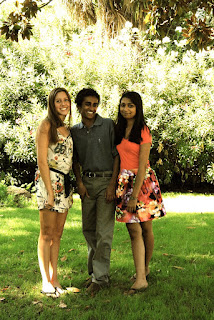
"Boulder, CO, September 15, 2009 – The Gloria Barron Prize for Young Heroes, an award that honors outstanding young leaders who have made a significant positive difference to people and our planet, announces its ten 2009 national winners.
The 2009 winners of the Barron Prize represent great diversity from all across the country. Winners each receive $2,500 to be applied to their higher education or to their service project. The 2009 winners are:
The 2009 winners are:
Otana, age 15, of California, whose in-depth research on the harmful pulmonary effects of ozone emitted from some air purifiers has led to a ban on the sale of these devices in the state of California.
Katie, age 11, of South Carolina, who has rallied hundreds of community members to assist her in creating several large-scale vegetable gardens in order to help feed the hungry.
Alexander, age 18, of New York, who founded “New York To New Orleans” (NY2NO), a non-profit group that has organized 15 trips for nearly 500 students from 35 different NYC high schools to do volunteer work in the Lower Ninth Ward of New Orleans.
Becca, age 18, of Utah, who created “AstroTots Space Camp for Little Dippers,” a free science camp for disadvantaged girls that is now offered in cities across the U.S.
Adarsha and Apoorva, ages 16 and 14, of California, who co-founded “Project Jatropha” to promote the use of the Jatropha plant as an eco-friendly and economically sustainable source of biofuel in rural India.Emily, age 17, of South Carolina, who founded the “Need to Read Book Club,” a non-profit organization that has raised over $17,000 in order to buy and distribute nearly 4,000 new children’s books.
Jonathan, age 18, of Pennsylvania, who created “Helping Hunger,” a student-driven organization that “rescues” food from caterers and restaurants and transports it to soup kitchens and homeless shelters.
Sejal, age 17, of California, who founded “Girls Helping Girls,” a non-profit group that has trained over 5,000 girls in nearly twenty countries in tackling problems such as poverty, education, and health care in their communities.
Rachel, age 14, of Texas, who has written a book profiling non-Jews who rescued Jews during the Holocaust. Through sales of her book, she has raised $13,000 to help support elderly non-Jewish rescuers, most of whom are living in anonymity in Europe.
Sujay, age 15, of New York, who has invented a technique using genetically-modified bacteria to convert waste into ethanol at a fraction of its current cost. Sujay has also founded ReSight, Inc., a non-profit organization that provides sight-saving eye surgeries for disadvantaged children in Southern Asia.
The Barron Prize was founded by author T.A. Barron and named for his mother, Gloria Barron. "
We would like to thank T.A. Barron, the Barron Prize Founder, and Barbara Richmond, the Executive Director of the Barron Prize, for choosing us. We will be reinvesting the $2,500 back in to the expansion of Project Jatropha.
Sincerely,
Adarsha and Apoorva














